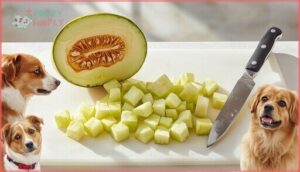This site is supported by our readers. We may earn a commission, at no cost to you, if you purchase through links.
When your dog stares at you with those pleading eyes while you’re slicing up a honeydew melon on a hot afternoon, you’re probably wondering if it’s safe to share. The good news? Yes, dogs can eat honeydew melon, and this invigorating fruit actually offers some worthwhile nutritional benefits.
Packed with vitamins, minerals, and about 90% water, honeydew makes a hydrating, low-calorie snack that many dogs enjoy. But like any treat, there’s a right way and a wrong way to serve it—and knowing the difference keeps your pup safe while letting them enjoy this sweet summer fruit.
Table Of Contents
- Key Takeaways
- Benefits of Honeydew Melon for Dogs
- Can Dogs Eat Honeydew Melon?
- Potential Risks for Dogs Eating Honeydew Melon
- Safe Feeding Methods for Honeydew Melon
- Recommended Feeding Amounts for Honeydew Melon
- How to Introduce Honeydew Melon to Your Dog’s Diet
- Frequently Asked Questions (FAQs)
- Conclusion
Key Takeaways
- Dogs can safely eat honeydew melon as an occasional treat if you remove all seeds and rind, and cut it into small, bite-sized pieces.
- Honeydew melon is low in calories, high in water, and provides vitamins like C, potassium, and fiber that support hydration and general health.
- Portion size should match your dog’s weight, with extra-small dogs getting just a couple tiny cubes and large dogs no more than four tablespoons per serving.
- Watch for signs of allergies or digestive upset, and consult your vet before offering honeydew melon to dogs with diabetes, kidney disease, or weight concerns.
Benefits of Honeydew Melon for Dogs
Honeydew melon isn’t just a sweet summer snack for you—it can offer real health perks for your dog too. This juicy fruit packs nutritional benefits that go beyond simple refreshment, from supporting hydration to providing essential vitamins without the calorie overload.
Let’s break down what makes honeydew melon a smart choice when you’re looking for a healthy treat option.
Nutritional Value and Serving Sizes
Honeydew melon’s nutritional value makes it a smart addition to your dog’s treat rotation. At just 36 calories per 100 grams, this fruit delivers impressive nutrient density without excess energy. You’re getting solid hydration value—about 90% water—plus meaningful vitamin C, potassium, and dietary fiber for gut health. Honeydew melon is also beneficial for blood sugar control.
Smart serving sizes keep macronutrient balance in check:
- Extra-small dogs: 1–2 small cubes (about 10 grams)
- Small dogs: 2–3 cubes (roughly 20 grams)
- Medium dogs: 3–5 cubes (around 30–40 grams)
- Large dogs: 5–10 cubes (up to 80 grams)
These portions deliver nutrients and fiber benefits while staying under the 10% treat guideline.
Low-Calorie Hydration
That 90% water content in honeydew makes it a hydration powerhouse for your pup, especially after playtime or during hot summer months. With roughly 684 mg of potassium per 100 grams, it aids electrolyte balance alongside fluid intake.
Honeydew’s 90% water content and 684 mg of potassium per 100 grams make it a hydration powerhouse that balances electrolytes after playtime
At just 36 calories per serving, it’s a revitalizing alternative to watermelon or cantaloupe—perfect for dogs on a low-calorie diet who still need those hydration tips.
Additionally, honeydew melon provides several health benefits that can aid your dog’s overall well-being.
Vitamins and Minerals
Beyond keeping your pup hydrated, this melon delivers a vitamin balance that promotes immune function and everyday health. You’ll find about 18 mg of vitamin C per 100 grams, plus potassium (228 mg) for muscle function and vitamin B6 for brain health.
Vitamin K aids blood clotting, while folate promotes cell growth. These minerals and vitamins work together to prevent mineral deficiency and boost nutrient absorption—real health benefits without dietary supplements.
Healthy Alternative to High-Calorie Snacks
When you’re trying to manage your dog’s weight or simply want to replace those calorie-dense biscuits, honeydew melon shines as a smart swap. A quarter-cup serving delivers only about 16 kilocalories—far fewer than most commercial treats that pack over 3,000 kilocalories per kilogram.
This fresh fruit nutrition lets you reward your pup multiple times within that recommended 10% treat budget without the guilt.
Can Dogs Eat Honeydew Melon?
Yes, dogs can safely eat honeydew melon when it’s prepared correctly. The key is removing any parts that could cause harm and serving it in a way that’s easy for your dog to eat.
Let’s walk through the simple steps to make honeydew melon a safe and enjoyable treat for your furry friend.
Preparing Honeydew Melon for Dogs
Preparing honeydew for your pup starts with good melon safety tips. Rinse the whole fruit under cool water for at least 20 seconds to remove surface bacteria and pesticides.
Cut on a clean board, then slice the flesh into bite-sized cubes no larger than half an inch for most dogs.
Store refrigerated pieces within 3 to 4 days for ideal freshness and digestive health.
Removing Seeds and Rind
Before you hand over that honeydew, you’ll need to do a bit of fruit preparation. The rind’s fibrous texture can lodge in your dog’s throat or intestines, creating serious digestive hazards—even blockages that require surgery. Seeds aren’t toxic, but they’re choking risks and can cause upset.
For safe feeding, dogs honeydew melon, scoop out every seed and peel away all rind, leaving only soft, clean flesh.
Cutting Into Small Pieces
Once you’ve removed the rind and seeds, cutting honeydew into the right size matters more than you might think. Aim for small, bite-sized cubes—no larger than one to two centimeters for smaller dogs—to prevent choking and support safe swallowing. These tiny pieces reduce the risk of airway obstruction, especially in toy breeds or dogs that gulp their food.
Uniform cubes also help you control portions, keeping honeydew melon within the 10 percent treat guideline for your dog’s daily diet. Whether you’re offering honeydew for dogs as a cool snack or mixing it into a summer fruit salad, proper piece size guidance and thoughtful fruit preparation turn this hydrating melon into a safe, enjoyable dog treat.
Feeding Honeydew Melon to Puppies or Senior Dogs
Puppies and senior dogs can enjoy honeydew melon, but age restrictions matter. Start with just one or two teaspoon-sized pieces to test puppy nutrition tolerance and senior diet needs. Their digestive systems are more sensitive, so watch for loose stool or upset stomach over the next 24 hours.
Fruit safety for dogs means gradual introduction—canine hydration benefits don’t outweigh digestive risks if you rush feeding dogs honeydew melon.
Potential Risks for Dogs Eating Honeydew Melon
While honeydew melon offers plenty of nutritional benefits, it’s not without its drawbacks. Like any treat, there are a few situations where this juicy fruit can cause problems for your dog.
Let’s look at the risks you should keep in mind before adding honeydew to your pup’s snack rotation.
Allergic Reactions
While fruit allergies in dogs aren’t as common as reactions to beef or chicken, honeydew can still trigger food allergy symptoms in sensitive pups. Watch for skin irritation—persistent itching, hives, or facial swelling—within hours of feeding.
Though anaphylaxis risk remains low, severe allergic reactions require immediate veterinary care.
Reaction prevention starts simple: introduce honeydew in tiny amounts, monitor closely for allergic symptoms, and stop feeding if any concerns arise.
Digestive Upset
Digestive upset strikes when honeydew’s natural sugars and fiber hit your dog’s system too fast. You might notice diarrhea, vomiting, or uncomfortable gas within 24–48 hours of feeding. Dogs with sensitive stomachs or those unaccustomed to fruit face the highest risk.
Start with tiny portions—just a cube or two—and watch for stomach upset. If diarrhea persists beyond two days, skip the melon and call your vet.
Intestinal Blockage
Rind and seeds slip past your dog’s chewing but sit stubbornly in the intestinal tract, triggering gastrointestinal risks that escalate fast.
Signs of intestinal obstruction include:
- Persistent vomiting that leaves your pup weak
- Little to no stool production despite straining
- Abdominal bloating and visible discomfort
- Lethargy that worsens over hours
- Difficulty defecating or passing only liquid
Canine emergency cases often require surgical intervention for foreign body removal when digestion stalls completely.
Choking Hazard
Just as indigestible melon rind can block digestion, large honeydew chunks or seeds pose a real Airway Obstruction risk. For Choking Prevention, always cut pieces smaller than your dog’s muzzle width. Supervise eating, especially with brachycephalic breeds—Food Safety matters. Quick Emergency Response can save lives if choking strikes, so keep treats small and monitor closely.
| Shape | Risk Level | Outcome |
|---|---|---|
| Large cube | High | Airway Obstruction |
| Small slice | Low | Safe Digestion |
| Whole seed | High | Emergency Response |
| Thin wedge | Low | Choking Prevention |
| Rind piece | High | Allergic Reaction |
Diabetes Concerns
Honeydew melon can disrupt diabetic management in dogs because its natural sugars trigger blood sugar spikes, complicating insulin regulation. Even though it’s low-calorie and packed with nutrients and fiber, those 14 grams of sugar per cup matter when you’re working hard on glycemic control.
If your dog has diabetes, skip the honeydew—or ask your vet first—to keep sugar intake predictable and safe.
Overweight Dogs
If your dog already carries extra weight, honeydew melon can still fit into their meal plan—but only if you’re careful. With nearly 60% of U.S. dogs classified as overweight or obese, healthy snacking and smart canine nutrition matter more than ever for pet wellness.
Here’s how to keep honeydew melon a low-calorie diet helper:
- Stick to the 10% treat rule – all snacks combined shouldn’t exceed 10% of daily calories
- Use honeydew as a swap – replace higher-calorie biscuits or processed treats
- Count pieces, not portions – one or two small cubes, not a bowlful
- Pair with increased activity – dog obesity rates improve with both diet and movement
- Monitor body condition weekly – weight management means tracking progress, not guessing
Consult your vet to tailor honeydew servings to your dog’s weight-loss goals and guarantee dog nutrition and health stay on track.
Safe Feeding Methods for Honeydew Melon
Once you’ve confirmed that honeydew melon is a good fit for your dog, the next step is figuring out the best way to serve it.
There are several simple methods that make this fruit both safe and enjoyable for your pup. Here are some practical ways to incorporate honeydew melon into your dog’s routine.
Cutting Into Cubes
Cube size guidelines can make the difference between a safe snack and a scary moment. When you’re preparing honeydew for dogs, aim for one-inch cubes as a starting point, then adjust based on your pup’s size. Smaller breeds need bite-sized pieces—think half-inch or less—while larger dogs can handle bigger chunks. Your cutting techniques matter for honeydew melon safety, so use a clean knife and cutting board.
Here’s a quick reference:
| Dog Size | Cube Size | Pieces Per Serving |
|---|---|---|
| Extra-Small (2-20 lbs) | ¼ to ½ inch | 1 cube, further divided |
| Small (21-30 lbs) | ½ to ¾ inch | 2 cubes, cut smaller |
| Medium (31-50 lbs) | ¾ to 1 inch | 3-5 cubes, bite-sized |
Proper fruit preparation means removing all seeds and rind before introducing new foods to dogs, and portion control starts with consistent cube storage in airtight containers.
Treat or Food Topper
Sprinkling small cubes over your dog’s regular meal transforms an everyday bowl into something more exciting. As a nutrient boost, honeydew melon works beautifully as a meal enhancer, adding fresh toppings without greatly increasing caloric intake. For a 500-calorie-per-day dog, 20–30 grams of honeydew contributes only about 7–11 calories—well under the 10% treat guideline—while delivering hydration and vitamin C.
Here’s how to make these healthy additions work:
- Use honeydew as dog treats during training sessions or scatter pieces on kibble for added interest
- Pair fresh fruits with your dog’s diet to increase moisture content without extra fat
- Choose honeydew over commercial healthy treats for dogs when watching weight
- Reduce base food slightly when adding these meal enhancers to maintain energy balance
Kong Toy and Freezing
A frozen Kong stuffed with honeydew melon turns snack time into canine enrichment that lasts 20–30 minutes. This frozen treat slows rapid eaters while delivering hydration—just keep portions within your 10% treat guideline to support Kong toy safety.
Plug the small hole with dog-safe paste, fill the toy with bite-sized melon cubes, and freeze overnight for a honeydew refresher that occupies your dog on warm afternoons.
Summer Fruit Salad
When summer heat peaks, a chilled fruit salad offers your dog both hydration and nutrition in one bowl. Combine honeydew cubes with dog-safe options like seedless watermelon, blueberries, and sliced strawberries to create healthy dog snacks packed with vitamin C and potassium.
These summer treat ideas meet canine hydration needs while staying within the 10% daily treat limit that promotes dog health and wellness. Skip grapes entirely—they’re toxic—and remember that fruit salad recipes addressing canine dietary needs require proper portion control to balance pet nutrition tips with your dog’s regular meals.
Recommended Feeding Amounts for Honeydew Melon
Regarding portion sizes, your dog’s weight matters more than you might think. A Chihuahua and a Great Dane shouldn’t get the same amount of honeydew, just like they wouldn’t eat the same size dinner.
Here’s a breakdown of safe serving amounts based on your dog’s size to help you treat responsibly without overdoing it.
Extra-Small Dogs
For extra-small dogs—think Chihuahuas or Yorkies—tiny breed nutrition means watching portion sizes carefully. Your mini companion weighing around five pounds needs just 2–3 very small cubes of honeydew melon, totaling about 10–15 grams. This small dog care approach respects their limited calorie budget while supporting canine hydration.
Here’s why mindful portions matter for miniature health:
- Choking risk: Their tiny airways need pieces smaller than a pea
- Blood sugar: Natural sugars add up fast in small bodies
- Digestive sensitivity: Too much can trigger upset tummies
- Calorie creep: One cube too many exceeds their daily treat limit
- Safety first: Always supervise while they enjoy this invigorating snack
Consider honeydew melon an occasional adventure in puppy feeding or adult canine dietary needs—not a daily habit. These water-rich bites offer dog health and wellness benefits when you follow smart pet nutrition advice, but moderation is your best friend. If you’re exploring dog treat recipes or wondering about safe fruit options, remember that even healthy snacks require careful measurement for your pocket-sized pal.
Small Dogs
If your small breed companion—say, a Pug or Cocker Spaniel—weighs between 10 and 25 pounds, offer 3–4 bite-sized cubes of honeydew melon per serving. This portion respects canine nutrition guidelines and aids dog hydration without tipping the calorie scale. Dogs eat honeydew best when it’s fresh, seedless, and sized for safe chewing—your dog’s health depends on smart pet safety choices and balanced healthy snacks.
| Feeding Tip | Why It Matters |
|---|---|
| Remove all rind | Prevents choking and digestive upset |
| Cut into small cubes | Reduces airway obstruction risk |
| Offer 1–2 times weekly | Keeps dog diet balanced and prevents sugar overload |
Medium Dogs
For a medium dog weighing 25 to 50 pounds, three tablespoons of diced honeydew melon hits the sweet spot in dog nutrition and health. That’s roughly 16 to 18 calories—well within canine health benefits guidelines when dogs eat honeydew as an occasional treat.
Cut bite-sized cubes to support honeydew melon safety for dogs, and offer this hydrating snack once or twice weekly to keep your medium breed care balanced and your dog diet on track.
Large Dogs
For large dogs weighing 51 to 90 pounds, you can offer about four tablespoons of diced honeydew melon—that’s roughly 24 calories per serving. This amount aids large dog hydration and big breed nutrition without tipping the scale on canine obesity.
Always cut the melon into bite-sized cubes to prevent choking, and remember that honeydew melon fits best as an occasional treat within your dog’s balanced canine health and nutrition plan, especially during dog summer care routines.
Extra-Large Dogs
If you’ve got a gentle giant over 91 pounds at home, around 50 to 75 grams of honeydew melon—about three tablespoons—makes a safe, hydrating treat without pushing past the 10 percent treat guideline for large dog nutrition. Always remove seeds and rind to prevent intestinal blockage, then cube the flesh into bite-sized pieces.
Dogs with diabetes or breed considerations like kidney issues need veterinary advice before adding this fruit to their canine obesity prevention plan.
How to Introduce Honeydew Melon to Your Dog’s Diet
Introducing any new food to your dog’s diet requires a thoughtful approach, and honeydew melon is no exception. Start with a small piece and watch how your dog responds over the next 24 hours.
Here’s what you need to know to make the change smooth and safe.
Monitoring for Reactions
When it’s the first time feeding honeydew to your dog, watch closely for any allergic reaction within the first two hours—hives, facial swelling, or vomiting can signal trouble. Track symptom timing and note any digestive issues like diarrhea or excessive gas. Emergency signs such as difficulty breathing or collapse require immediate veterinary guidance.
Start with moderation and monitor your pup’s response to verify fruit and vegetable safety.
Consulting a Veterinarian
Before you introduce honeydew melon to your dog’s diet, consulting a veterinarian is always your safest bet. Veterinary guidance helps you determine whether this fruit fits your dog’s unique health profile—especially important for dogs with diabetes, weight issues, or digestive sensitivities.
Your vet can provide customized pet nutrition advice and dietary planning that considers:
- Your dog’s current body condition score and calorie needs
- Appropriate portion sizes based on weight and age
- Potential interactions with existing health conditions
- Safe hydration options alongside fruit treats
- Whether vet approval is needed before starting new foods
Health consultations guarantee vet recommendations align with your pup’s wellness plan.
Balancing With Other Fruits and Vegetables
Variety works wonders when you’re planning healthy snacks for your dog. Mix honeydew melon with low-calorie vegetables like carrots, green beans, or celery to create a balanced fruit and vegetable rotation.
This approach helps you control calories while offering different hydration options—watermelon, cucumbers, and apples all bring unique nutritional benefits.
Keeping treats under 10% of daily intake ensures your pup enjoys fresh fruit safely without compromising their core diet.
Frequently Asked Questions (FAQs)
Can dogs eat honeydew melon?
Like a cool breeze on a summer day, honeydew melon offers dogs safe hydration and nutrients—if you remove seeds and rind first.
Feed bite-sized pieces sparingly to support your dog’s digestive health without upsetting their diet.
Can dogs eat honeydew?
Yes, honeydew makes a revitalizing, hydrating dog treat when you remove seeds and rind first. Its low calories, vitamin C, and high water content support canine wellness—just cut into small, bite-sized pieces.
Can dogs with kidney disease eat honeydew melon?
Before you feel melon-choly over treats, know that honeydew requires careful Veterinary Guidance for dogs with Kidney Disease. Its high Potassium Levels and moderate phosphorus demand strict portion control within specialized Renal Diet Planning to protect your pet’s health.
Can dogs eat melon?
Most melons—including watermelon, cantaloupe, and honeydew—are safe for dogs when you remove seeds and rind.
These hydrating fruits offer vitamins and fiber, making them healthy occasional treats in moderation.
Can dogs eat melon seeds?
Picture your pup struggling to pass something sharp and hard—that’s the danger of melon seeds. They aren’t toxic, but seeds pose choking and gastrointestinal hazards.
Always practice seed removal tips before serving honeydew melon to guarantee canine digestion stays smooth and safe.
Can dogs eat cherries?
Cherry pits, stems, and leaves contain cyanogenic glycosides that release cyanide, a compound toxic to dogs. While pit-free cherry flesh isn’t poisonous, the preparation risk and choking hazard make safer fruit alternatives preferable.
Can dogs eat avocado?
Avocado flesh offers some Avocado Nutrition, but the pit, skin, and leaves contain toxins dangerous for dogs.
High fat can upset digestion, so stick to tiny amounts, watch for Dog Allergies, and prioritize Fruit Safety for Pet Wellness.
Can dogs eat fruits & vegetables?
Worried about safety? Many fruits and vegetables, like apples, carrots, and blueberries, are safe for dogs when given in moderation.
They offer key vitamins and hydration, supporting Pet Wellness and a balanced Canine Diet as Healthy Treats.
Is honeydew melon toxic to dogs?
Honeydew melon isn’t toxic to dogs—the edible flesh is considered safe.
For ideal fruit safety and canine health, always remove the rind and seeds, serve small pieces, and introduce it gradually to watch for melon allergies or digestive upset.
Are any melons toxic to dogs?
Regarding Melon Toxicity and Pet Safety, you’ll be glad to know watermelon, cantaloupe, and honeydew melon aren’t toxic for dogs.
Just remember: remove seeds and rind, and serve in moderation for best Dog Health.
Conclusion
Sharing honeydew melon with your dog is like offering a cool breeze on a hot day—invigorating, but best enjoyed in moderation. When you know the right way to serve it, can dogs eat honeydew melon becomes less a question and more a safe, simple pleasure.
Remove seeds and rind, watch for reactions, and consult your vet if unsure. With care, this sweet fruit can add variety, hydration, and a touch of adventure to your dog’s routine.















